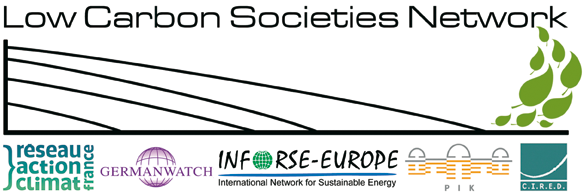Project name: ENCI-LowCarb
ENngaging CIvil Society in Low Carbon Scenarios
Project Period: April 2009 - March 2012
Summary: Within the European project “ENCI-LowCarb”, low carbon scenarios for Germany and France were developed based on stakeholders' contributions by using an interactive scenario creation process as well as a Network was created, which continues also after the Project’s end.
Financing: 7th Framework Program for Research of the European Commission.
Project Coordinator: RAC-France, att. Meike Fink.
Main Focus of the Project
Energy scenarios outline possible low-carbon futures built around assumptions on fossil fuels prices evolution, technological choices and the mechanisms of energy demand and supply, among others. Scenarios are influential tools in political decision-making processes since they shed light on the long-term impacts of today's investment decisions, especially regarding infrastructures. This is why it is crucial that these pathways derive from discussions with main national stakeholders.
The core idea of this project was to develop a methodology for the transparent integration of stakeholder contributions in the scenario creation process in order to enhance the stakeholder acceptance of the resulting low carbon pathways. By adding this element an important step is made from showing what is technically and economically possible to what is feasible and accepted. Many energy scenarios are based on public or stakeholders consultations. However, few attribute importance to the scenario design process and explain in a transparent way how contributions are taken into account and integrated in a modelling tool, that is to say how the translation process was carried out from an idea supported by contributors to its representation in the modelling tool.
The project ENCI-LowCarb aimed at exploring this scientific gap. The innovation of the ENCI-LowCarb project resides less in the resulting energy scenarios than in the scenario creation process itself.
Please do not hesitate to contact the project partners if you want to know more about the methodology and the experience of applying it.
Activities of the Project:
Network on Low Carbon Scenarios:
Creation of a European network on low carbon scenarios composed by CSOs (Civil Society Organizations) and researchers in order to establish a lively exchange on existing energy scenarios and best practices already applied today and indispensable to meet the requirements of a low carbon society. The name of the established Network is “Low Carbon Societies Network”, and you are on the website of this network. www.lowcarbon-societies.eu .
Scenarios for Germany and France:
Development of several low carbon scenarios for Germany and France with an ambitious greenhouse gas emission reduction target using macroeconomic models developed by CIRED (IMACLIM-R for France) and PIK (REMIND-R for Germany).
Using these modelling tools allowed evaluating different panels of policies and their economic impacts on sectoral activity, on employment and on prices of goods. The assumptions (technical and economic) of the scenarios were defined exclusively by national stakeholders (trade unions, consumer associations, private companies etc.) who were invited to thematic workshops (residential, transport, electricity).
Their contributions were translated in the modelling tool and the outcome of this translation process was again assessed by the stakeholders. The results of this iterative process are several scenarios for France and Germany based on a set of policy measures, necessary to escort the transition of our today high-carbonised society to a climate friendly one. |


 March, 2012
March, 2012